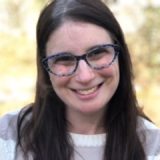“For the Jews there was light, happiness, joy and honor. So may it be for us.”
This quote comes from the story of Purim when the Jews celebrated the survival of the Jewish people, parading in the streets. During the month of Purim—the month of Adar, which we began just a few days ago—we are instructed to be happy. It has become a mantra for me throughout many life stages, in times of celebration and in challenging times.
When my husband, Steve, and I got married, we wanted our wedding invitation to include a Hebrew quote, something that felt right to us. We realized that after dating much longer than our friends prior to getting married, the sentiment was true. For all of our friends there were fancy parties and hotels and flowers and flower girls, and now it was our turn.
As we began our life together, over the next few years we became ready for that next stage of light, joy and happiness of building a family. But it wasn’t happening. So often when we enter our adult lives, we have hopes, so we begin to build a picture in our heads, a dream. We set goals to try to achieve those dreams, and as they unfold sometimes there are bumps in the road.
But no matter how much I dreamt about and envisioned it, it just wasn’t happening.
Judaism puts such a high value on having children. In the Torah, while there are stories of struggles with procreation, having children is seen as being worthy of God’s blessing. As I struggled with my fertility, I wondered: Will I be blessed by God? Do I deserve to be blessed by God?
It was easy being someone who believes in God and who was on a fertility journey to get seduced by the notion that having children is predetermined by fate, that for some reason God did not seem to be choosing for me to have children. Because of these connections between God and procreation, while I was struggling with fertility there were many times when I felt I was not “meant” to have children, and that led me to isolate myself from my Jewish community. I felt I did not belong when I hit a new stumbling block in my health requiring surgeries or medications, or when I had a miscarriage and dealt with the devastating loss. When you have a pregnancy loss, that loss is not only the loss of the being growing inside, but the perceived loss of hope to achieve your family dream.
That said, while in the process, I also connected with one other Jewish professional on a fertility journey through a contact from Mayyim Hayyim in Newton. We met for coffee, gathered our spouses for Shabbat dinners and traded secrets about how to manage our health care. We commiserated over the silence of the struggle as Jewish leaders and we empathized with one another when holidays like Purim arrived with our friends’ children as adorable fuzzy monkeys or bunnies or superheroes. I am confident that I was able to move forward and build my family because of this relationship that I built, because of what I learned from my peer and because of the strength I found in connection.
no posts found
When you’re struggling to build your family and you desperately want that light, happiness, joy and honor, the last thing you feel you can do is open up to someone or let it be known to your community that you are struggling. We need to create spaces that feel safe and comfortable for people to come out and gain strength from the community.
To achieve that, I started Uprooted: A Jewish Response to Fertility Journeys, and I’m proud to say that thanks to a generous grant from Combined Jewish Philanthropies, the Boston Jewish community is now building a local chavurah program called The ROOTS for couples and individuals on a fertility journey. Clergy members will be leading sessions throughout the spring at the home of a local family so we can bring light, happiness, joy and honor to one another. When we’re on a hard journey, we need that light, and one way to provide it for ourselves if we cannot ignite the light is to turn to others for that initial flame.
I invite you to spread the word and share this with your friends and family, children, nieces, nephews, anyone you may know who is on a fertility journey and who may need a little light in their lives.
Fertility journeys range in experience. For many that means struggling to conceive and for many others that means struggling to carry a child or needing to build their children through alternative methods. Uprooted is a community for all. As part of that community, we have gathered many individuals who will serve as hosts and mentors who went through a similar experience five, 10 or even 25 years ago. They understand the struggle and they want to help others. At Uprooted, we call those mentors Shamash, people who can be the helper candle as you try to reignite your flame.
It is no surprise that our rabbinic leaders took the quote, “For the Jews, there was light, happiness, joy and honor,” and incorporated it into the havdalah prayer, the weekly closing of Shabbat. We light a braided candle, raise a cup of wine, assemble spices and prior to saying the blessings on these items, we begin the Saturday night prayer with these words. When doing so, the rabbis added an affirmation, a call and response component: “So may it be for us.”
We need to remind ourselves weekly that we all deserve that light, not as spectators watching other flames ignite but igniting our own.
When we come together as a community, we can take our eternal flame, our neir tamid, and easily lend a hand to those whose flame is low right now. They need light and they need hope, and when they see that their light is eternally connected to the larger light of the Jewish people, they will be able to see new connections, possibilities and strength to move forward through their journey.
This post was adapted from a Dvar Torah (speech on the weekly liturgy) shared on Feb. 28, 2020, at Temple Beth Shalom in Needham.
This post has been contributed by a third party. The opinions, facts and any media content are presented solely by the author, and JewishBoston assumes no responsibility for them. Want to add your voice to the conversation? Publish your own post here. MORE



